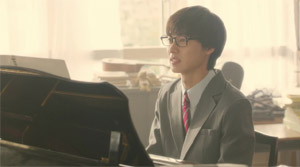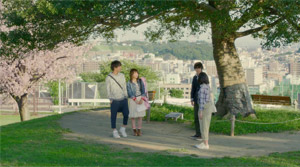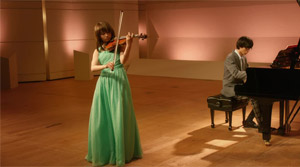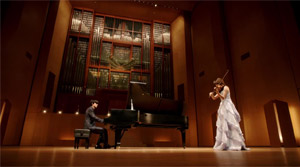

Shigatsu wa Kimi no Uso
Japan 2016
Genre:
Drama, Romance
Director:
Takehiko Shinjo
Cast:
Suzu Hirose
Kento Yamazaki
Anna Ishii
Taishi Nakagawa
Yuka Itaya
Rei Dan
Masahiro Komoto
Hirotaro Honda
Kaori Yamaguchi

Your Lie in April

Story: Kosei (Kento Yamazaki) is a genius at the piano, but he doesn't play anymore since he can't hear the sounds he produces from a
certain point onwards because of a trauma. The reason for it is to be found somewhere in his childhood, which he hasn't processed in a healthy manner,
yet. His friends Tsubaki (Anna Ishii) and Ryota (Taishi Nakagawa) take him to a competition at their school, where they hear the girl Kaori (Suzu Hirose) play
the violin. Her rebellious nature at the instrument makes her win over the audience and Kosei's friends introduce her to him. Kaori regards music as the
purest form of freedom and in her next concert she wants to play a duet with Kosei. Being exposed to the pressure of his friends the student thinks about it
but has to acknowledge that the can't play the piano in front of an audience anymore. However, Kaori doesn't accept no for an answer and makes a journey to
the source of the student's trauma: his mother (Rei Dan), who was a very strict teacher and moreover died from a lengthy sickness. Tsubaki doesn't like seeing
Kosei and Kaori get along well, especially since the violinist was actually introduced to Ryota as a potential girlfriend. But soon fate strikes in an even
crueler fashion...





Review: In a lot of ways "Your Lie in April" is a better movie experience when you are familiar with a few facts and the film's tone beforehand.
First of all, the movie seems to be a teen romance. But the story based on a manga by Naoshi Arakawa turns out to be surprisingly multilayered and the adaption
also appears to be a music film, which introduces a few nice classic pieces. But be warned that from the second half onwards the picture reveals itself to be a
true drama piece and the last third even drags the drama part too much. Yet, the movie is a lot better than you would assume. And if you are familiar with the
film's actual tone, or if you know the original, you won't be surprised and thus will be able to appreciate "Your Life in April" a lot more.

The first half revolves around three friends and a girl who helps the protagonist to overcome a trauma. Kosei's background story is very effective and the
flashbacks with his mother don't bestow something episode-like on the movie at all, as is usually the case with movies based on mangas. Furthermore,
director Takehiko Shinjo goes astonishingly deep into this matter, making music and Kaori something like therapists for the pianist. The musical performances
are truely impressive. We get a few classic pieces for piano and violine in all of their glory and you even get the impression of really watching a concert.
The energy the movie manages to ooze out with its music is fantastic and one of its big strengths.

Moreover, there aren't just pieces played which are known by every ordinary person, but also a few lesser known ones. The selection is great and probably only
philistines will feel bored here. What's also impressive is that the actors learned their instruments quite well for their roles and accordingly deliver a
very convincing performance of two individuals who are masters of their instrument. Since I already feared to sit in front of a teen romance like
"Strobe Edge" I was positively surprised. Another reason for that being that the characters are well elaborated and therefore can
bring to screen a few unexpectedly well achieved romantic moments. Particularly at the beginning the movie is full of youthful energy and scenes of an
innocent love story about to bloom.

Kento Yamazaki plays Kosei with the necessary weight lying on him as he isn't actually the most cheerful guy. Suzu Hirose ("Rage") on the other hand often
seems a bit too energetic and extroverted. You can't really call this good acting, but you should wait for the second half of the movie, when the dramatic
twist is revealed. Then, it becomes apparent that she actually delivers a pretty neat portrayal. It's difficult not to reveal too much of the story while
at the same time prepare the viewer for what to expect in the end. And what you should expect is in fact an illness, hospital visits and many tears. While "Your
Lie in April" succeeds in steering clear of most hackneyed moments when it comes to the teen romance it doesn't manage to do so regarding the drama. This
doesn't mean, though, that the drama isn't effective as well. This is where the music once more manages to bring to bear the emotions quite skillfully.





But to be fair, the drama could have turned out a lot worse. Strictly speaking and retrospectively it isn't as obtrusive as you are used to see. Yet, there surely would have been material to be cut. With its 121 minutes the movie maybe is a bit too long, after all. Contrary to the original the manga adaption is also more grounded in reality and the colors aren't as lush or garish as in the original, even though particularly nature is captured in beautiful colors. "Your Lie in April" manages to make the romantic story feel like it isn't one at first since the fun-loving Kaori seems to be more of a friend who sets Kosei free from his fears which are strongly connected to the death of his mother. But of course we know where all of this is ultimately heading. Only the focus on the drama may be surprising, which is why you can consider yourself warned, now. After all, besides that this romantic drama proves to be well-achieved, also thanks to nice classical music and a lot of energy, and therefore is not just aimed at 14-year-old girls.

Disclaimer










